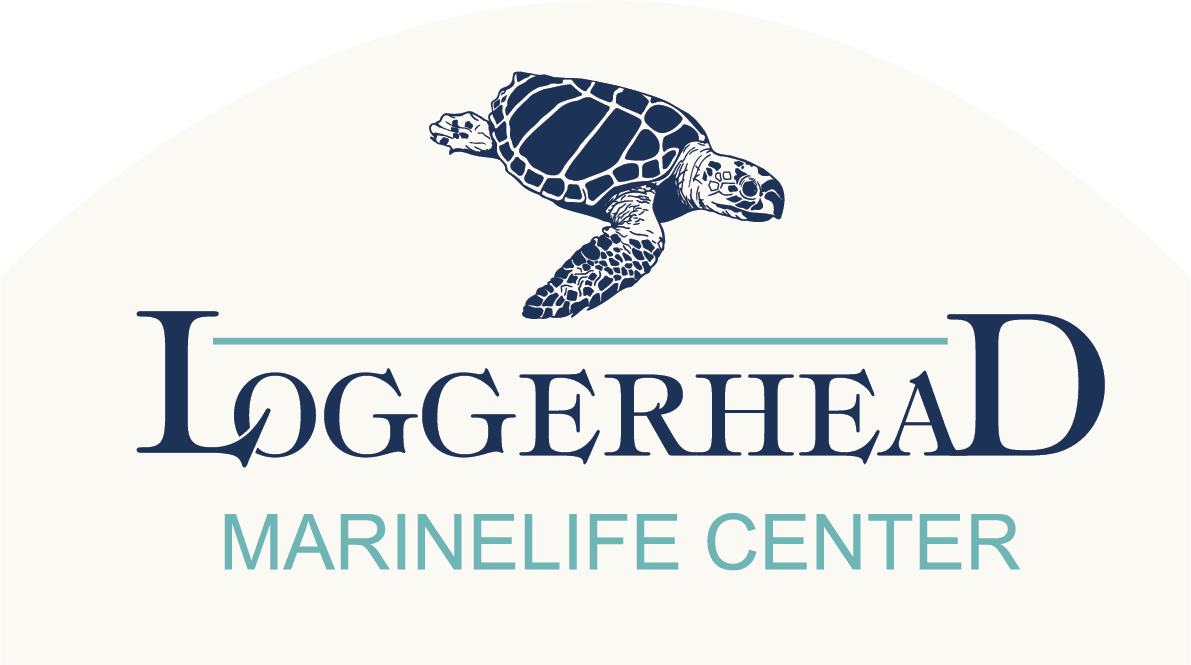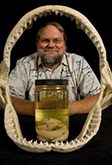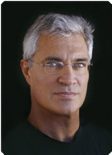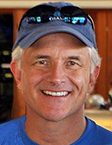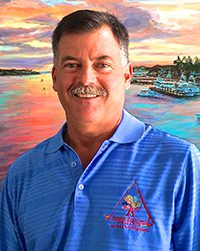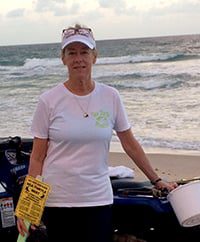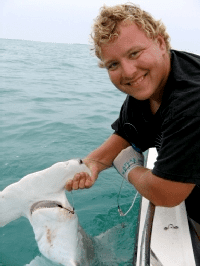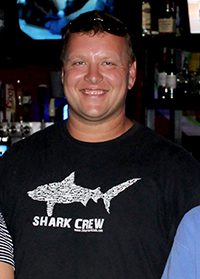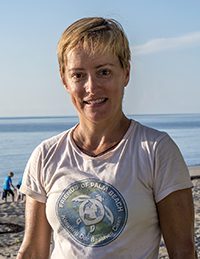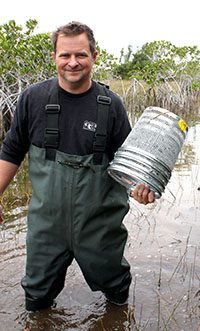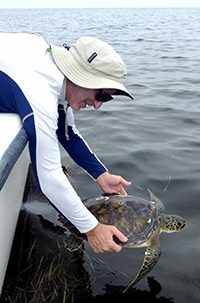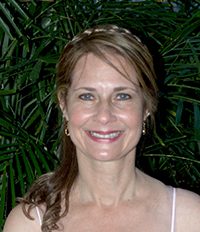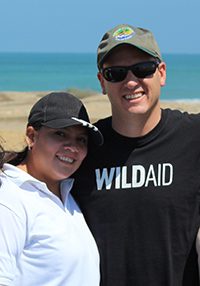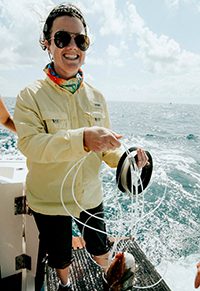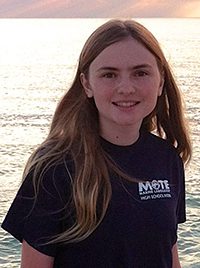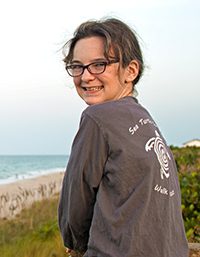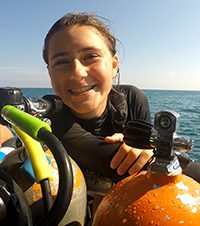Congratulations to all of this year’s finalists!
The winners will be announced at the Eighth Annual Go Blue Awards Luncheon,
being held at PGA National Resort & Spa on Friday, October 28, 2016.
Eleanor Fletcher Lifetime Achievement Award Finalists:
The recipient of the Eleanor Fletcher Award exemplifies a lifelong, extraordinary commitment to marine conservation education through their work or volunteer activities similar to Loggerhead Marinelife Center Founder Eleanor Fletcher.
George H. Burgess – Florida Museum of Natural History
As the Florida Program for Sharks Director at the Florida Museum of Natural History, George Burgess has been involved in shark research and conservation for over 40 years. The Florida Program for Shark Research is one of four programs comprising the National Shark Research Consortium. The objectives of this consortium are to increase the scientific knowledge of sharks and to develop public outreach and conservation initiatives. The Florida Program for Sharks also includes the International Sawfish Encounter Database and the International Shark Attack File and hosts the distinguished website focusing on shark research, fishery management and conservation.
The Florida Program for Sharks collection of nearly 220,000 shark specimens is contained in bottles that range in size from very small pill-sized bottles to large tanks. This extensive collection is one of the top 10 in North America and is located in the Florida Museum of Natural History at the University of Florida. With the steady decline in shark populations, these are an immensely important record of the many shark species.
The International Shark Attack File is a digital and paper collection of records housed at the Florida Museum of Natural History. The records include thousands of files of medical records, victim interviews and photographs of shark-related wounds. The File was started in 1958 with Navy funding and moved from several locations until ending up in Gainesville in 1988. It was originally created in an attempt to develop a shark repellent for the Navy. George Burgess along with shark biologists from around the world use these records for their research studies. It’s significant to note that the collection has helped shatter the myths about how often bites occur and their severity, and lead to better medical treatment for bite victims.
According to Florida Today, “Burgess’ fascination with the ocean’s apex predators has continued for the four decades that he has studied sharks professionally. ‘No matter how much research is done,’ he said, there is always more to learn.’ Sharks are about 400 million years old and have been ‘fine-tuning an evolutionary plan that has helped them survive that long, and developed them into fine predators,’ he said. ‘That’s largely built around their senses. They’re basically swimming sensory machines.’
As a kid, Burgess would linger over undersea pictures of sharks in Jacques Cousteau’s 1953 book “The Silent World.” He was fascinated by the ocean’s most “charismatic” predator. But he was scared of the water, because he had asthma and feared he could not breathe. His parents bought him a snorkel and mask, which opened up his world. He began collecting specimens, pickling them in formaldehyde.
“I had jars in my bedroom, much to the chagrin of my mother,’ Burgess said. ‘You couldn’t throw away a mayonnaise jar in my house. That was a specimen jar.’ Burgess spent decades aboard boats for field work to study and tag sharks and rays and sawfish.”
He has worked for more than 40 years to further the study of sharks, debunking the myth that they are man-eating monsters and promote conservation of these important apex predators. His research interests include the life history, ecology, systematics, fishery management and conservation of elasmobranchs (sharks, skates and rays), shark attacks, systematics and biogeography of fishes and management, and conservation of aquatic ecosystems and their faunas and floras – especially the marine environment.
Outreach projects include Project Shark Awareness, a program aimed at teaching educators about elasmobranch life history/ecology and the fishery management/conservation needs of the group, so they can pass on the messages to their students, as well as the development and maintenance of a website focusing on the biology, management and conservation of fishes and elasmobranchs. Burgess also works with IUCN/SSC Shark Specialist Group as vice chair, promoting sustainable fisheries and conservation of the world’s elasmobranchs.
Louie Psihoyos – Oceanic Preservation Society
Louie Psihoyos, executive director of OPS (Oceanic Preservation Society), is recognized as one of the top photographers in the world. He was hired directly out of college to shoot for National Geographic and created images for the yellow-bordered magazine for 18 years. His ability to bring humanity and wit to complicated science stories carries over to his filmmaking.
An ardent diver and dive photographer, he feels compelled to show the world the decline of our planet’s crucial resource, the oceans. Psihoyos’s life mission is to elevate the awareness and engagement of the global community around the plight of endangered species and our oceans at large by using cutting edge media that ignites global movements.
OPS, the non-profit he founded in 2005, uses film, photography, collaboration and story-telling to inspire the global community to take action around key environmental issues that threaten endangered species and our oceans at large. Psihoyos’ first documentary film, The Cove, won the 2009 Academy Award for Best Documentary and over 75 other awards around the world. The film garnered immense critical praise and has been seen by millions of viewers worldwide. Additionally, this film has led to at least a 50 percent decline in dolphin slaughters in Taiji, Japan – the area where his lens was focused for this film project.
His second film, Racing Extinction, follows a team of artists and activists as they expose the hidden world of extinction with never-before-seen images that will change the way viewers see the world. The film premiered on Discovery in 220 countries and territories over the course of one day, was seen by over 36 million viewers and sparked the #StartWith1Thing movement.
Always looking for new, innovative ways to bring a spotlight to the issues, Psihoyos was also the creative mind, along with Obscura Digital, behind the unprecedented large-scale building projections onto the United Nations Headquarters and Empire State Building, which was documented in Racing Extinction. The projections themselves have become a traveling phenomenon, most recently being produced on St. Peter’s Basilica at The Vatican which reached over 147 million people via traditional media, along with 4.2 billion social media impressions. Psihoyos is currently in production on a feature documentary about plant-based super athletes. This film is due to be released in 2017.
Louie has truly dedicated his life to bringing a voice to the voiceless by turning his camera lens towards those that need to be in the spotlight the most – those that are unable to speak, protect or advocate for themselves. His work around conservation issues is far from over; Louie is dedicated to making more films, taking more captivating images, and pressing on with global initiatives that serve as a wake-up call for all of humanity. He seeks to create tipping points that galvanize the public around addressing key environmental initiatives before it’s too late.
In addition to film and photography, Louie is a visionary artist and activist that thinks outside of the box. And Psihoyos walks the walk, living as a vegan and working full-time for his non-profit, OPS, and on film projects that address these time sensitive issues around conservation.
Wolcott Henry – Conservationist
Wolcott Henry is an accomplished underwater photographer with a dedication to marine conservation. As president and chair of the Curtis and Edith Munson Foundation and The Henry Foundation, he has aligned himself professionally with foundations which not only share in his commitment to conservation, but are dedicated to support on the ground efforts.
Wolcott has a long history of dedicating his time and expertise in the non-profit field through board service. He served on the board of directors of Earth Echo International, World Wildlife Fund – Philippines, and The Ocean Foundation, of which he was a founding chair. His prior board service includes the International League of Conservation Photographers, World Wildlife Fund – U.S., FotoWeek DC, the Divers Alert Network (DAN), and the Ocean Conservancy. Wolcott also serves on the advisory boards for Reef Environmental Education Foundation (REEF), national council of World Wildlife Fund – U.S., the Smithsonian Ocean Science Initiative and the Frost Museum of Science.
Wolcott has worked passionately throughout his career to promote conservation photography – a concept of using underwater imagery to shed light on the unique challenges facing the natural world. He acknowledged the importance of engaging the public in marine conservation issues with an understanding that due to geographical and economical limitations, only a limited portion of the population has the ability to experience life underwater. Wolcott had a desire to bring the underwater world, as he knew it, to everyone. He worked to help establish the marine photo bank, a photo sharing site dedicated to advancing ocean conservation through imagery. The site provides high quality images, at no cost, to the non-profit community for use in public outreach and educational projects.
Wolcott continued his focus to spread conservation education through underwater imagery and collaborated with Dr. Sylvia Earle on two children’s books. The first, Hello Fish and Sea Critters, published by the National Geographic Society, uses dynamic photographic images to engage children in life underwater. The second, a large format book, titled Wild Ocean, that explores the United States National Marine Sanctuary System.
Wolcott’s commitment to offer support to marine conservation efforts has been evident throughout this career. He is a member of the Consultative Group on Biodiversity – a group of foundations working on environmental issues, where he helped to develop the Marine Working Group to focus specifically on issues impacting oceanic environments.
In 2011, Wolcott was recognized for his many contributions to ocean awareness and conservation when he received the Lifetime Achievement Award by the National Marine Sanctuaries Foundation.
Despite his long list of accomplishments, Wolcott has remained down to earth, humble and committed to grass roots conservation efforts.
Blue Ambassador of the Year Finalists:
The recipient of the Blue Ambassador of the Year Award exemplifies significant local contributions in marine conservation through volunteer-related activities.
Scott Harris – Andrew “Red” Harris Foundation
Scott Harris serves as the President of the Andrew “Red” Harris Foundation, a 501 (c)(3) nonprofit based in Jupiter. The foundation’s mission is to enhance the marine environment in northern Palm Beach County by providing a conduit for funding artificial reef construction to provide new habitat for marine life that is threatened by a host of issues related to population growth.
The nonprofit foundation has raised over $700,000 to build new reefs (including a $260,000 deployment agreement with Palm Beach County) since its inception in July 2014 after Harris’ son Andrew lost his life in a boating accident. The Foundation placed a new reef made with 40 concrete coral head replicas weighing 8,000 pounds, 1.5 miles northeast of the Jupiter Inlet in August 2015. The reef is thriving and teeming with marine life, with many pictures and videos of the reef on the foundation’s website and Facebook page.
In 2015 Scott discovered and extensively surveyed an ideal shallow sand site on top of a flat plain of bedrock 800 feet east of the 2015 deployment. Presumably this area was once a productive reef before it was smothered by sand. Palm Beach County agreed the site was ideal and worked with the permitting agencies to expand the existing permit boundaries to include this site. The Foundation created its second reef in August 2016 on this ideal new site.
The 2016 project used 100 modules of three different designs to create a new reef. The new Andrew Red Harris Foundation No Shoes Reef is comprised of 50 eight-foot tall limestone rock encrusted concrete pyramids, 35 seven-foot tall Bahamian coral head replicas of original design and 15 unique concrete block structures. Scott secured engineered drawings for each of the new designs and was the primary builder of the concrete block modules.
The 2017 reef creation will expand the ideal 2016 site with a combination of the two great designs that Scott created and reef pyramids. Final 2017 module design will be selected after monitoring the 2016 reef. The Foundation will also be donating 15 of lagoon sized coral head modules for placement on the popular Blue Heron Bridge snorkeling trail in September, 2016. The modules will serve as beautiful guideposts to protect snorkelers from getting lost while providing great habitat on the trail. All of the Foundation’s new reefs provide great new habitat for fish and other marine life to spawn and build their populations on as our marine habitat struggles to endure the threats created by population growth, pollution and invasive exotic species. In addition to the 2017 reef project, Scott is working with the Town of Jupiter to create and fund a beautiful 500-gallon aquarium in the Town’s activity center to promote education on the value of our local marine resources. A significant developing project is using the foundation as the ideal lead fundraising and lobbying entity in a public/private effort to bring a huge artificial reef eco-tourism project to Jupiter in partnership with the State of Florida and Palm Beach and Martin counties.
Many local residents and environmental supporters have come forward to assist the foundation in its work by donating their time and skills to run the foundation, help build the modules, raise money, run events and more. The Town of Jupiter is a strong supporter and recognizes the foundation as the construction arm of its Comprehensive Plan-mandated artificial reef initiative. Scott’s specific contributions to marine conservation include building the Andrew Red Harris Foundation into a significant entity for creating, designing and funding artificial reef projects both offshore and inshore.
Joan Lorne – Permitted sea turtle monitor
Joan Lorne’s support for marine conservation began over 20 years ago when her daughter, Jackie, showed an interest in marine biology at the age of 12. Joan would selflessly drive Jackie every Saturday for four years from Delray Beach to the Marinelife Center of Juno Beach (now Loggerhead Marinelife Center) so she could spend the day volunteering. For two of those four years, she and Joan volunteered at the center during the nighttime turtle walks. As she helped Jackie achieve her dream of becoming a marine biologist (which she did become), she sparked an interest of her own in marine conservation, in particular, sea turtle conservation. For over the last 10 years, Joan has been a permitted sea turtle monitor for the Town of Gulfstream and a portion of Ocean Ridge. Several days a week she monitors about three miles of local beaches to document new sea turtle nests.
She takes it upon herself to purchase all the stakes used to mark approximately 700-900 nests annually on the beaches. She also paints all the stakes herself. In addition to this, during nesting season, Joan typically drives to Gumbo Limbo at least once a week when she finds weak hatchlings on the beach. Her work, however, does not stop there. She typically spends at least an extra hour on the beach each of those mornings educating the public, forming relationships with tourists and locals alike, who anxiously await her on the beach. She even follows up with many people by sending them additional educational information via email.
Joan also supports St. Vincent Ferrer School in Delray Beach each year during their annual beach clean-up on Earth Day by using our sea turtle monitoring ATV to assist the school with beach clean-up efforts. Joan was also instrumental in getting world-renowned underwater photographer Chris Gug to speak to St. Vincent Ferrer School during Earth Week in 2016. She also actively promotes marine conservation by speaking regularly with a local newspaper, “The Coastal Star”, and is a regular contributor of marine conservation related photos to their website. In addition, whenever Joan meets a child who is interested in marine biology, she offers to take them on the beach so they can shadow her as a sea turtle monitor.
In 2014, Joan, along with other sea turtle monitors on my permit, was awarded the Saint Francis Award by St. Joseph’s Episcopal Church for her work in the area of marine conservation. She is also a regular contributor of videos to WPTV to highlight sea turtle awareness and conservation.
Dr. Derek Burkholder Ph.D. – Nova Southeastern University
Derek grew up in Michigan spending a lot of his childhood exploring the woods and spending time on the water (though slightly less salty water than he deals with now). His love for the outdoors and the water started early and on a family vacation to Florida when he was 8 years old and went on a marsh tour with a marine biologist.
He received his bachelor’s degree from Albion College in Michigan and during that time was first introduced to the amazing world of shark research. After graduation he moved to Florida as a research scientist at MOTE Marine Lab for a year before starting his graduate studies. Derek received his Ph.D. from Florida International University in 2012 and is currently working as a research associate as part of the Guy Harvey Research Institute and Save Our Seas Shark Center at Nova Southeastern University.
Derek is currently working as a research scientist as part of the Guy Harvey Research Institute and Save Our Seas Shark Center at Nova Southeastern University. He has assisted Dr. Harvey with all aspects of shark research, including tracking and data analysis. His work at Nova focuses on building a local shark tagging program in South Florida where he is studying shark movements, shark diets and genetic population structure. He is instrumental in educational outreach programs and organizes periodic shark tagging expeditions for the general public. The children have the opportunity for a very hands-on experience on these expeditions. They place hooks in the bait, let out the line and drop the weight. When the sharks are reeled in, the children measure them, take DNA samples and place the tags in the dorsal fins. It is an extremely exciting and unforgettable experience for everyone, especially the children.
Derek is most interested in predator-prey behavioral interactions and the impact those relationships have on the structure of marine communities and prey populations. He closely examines shark community dynamics, foraging patterns and habitat use and the movement of shark communities in South Florida and Australia. He visits classrooms in person or via Skype to engage children with sharks and sea turtles. He promotes conservation of all marine species and is the author of dozens of publications.
Derek currently serves as the Vice President of Sharks4Kids Inc., an educational non-profit organization working to bring shark education and conservation to kids of all ages around the world. He organizes numerous dives and snorkeling trips with sharks for students of all ages. He makes presentations on behalf of Sharks4Kids that stress the need to protect these animals, and supports their functions throughout the country. The goal is to make the future generation one of shark advocates by giving them access to a wide range of educational materials. A curriculum can be provided to Science classrooms as well as games and activities. Shark photography and videos from scientists and conservationists exemplify the ocean’s beauty with students and bring another dimension to the classroom.
Derek is also the primary Investigator with the Broward County Sea Turtle Conservation Program at Nova, monitoring 24 miles of sea turtle nesting habitat in Broward County. Additionally, he serves as the Director of the Marine Environmental Education Center at the Carpenter House in Hollywood, Florida. He also organizes private and public turtle hatchling releases throughout the summer. Through Derek’s efforts, hundreds of thousands of individuals have been able to witness this miraculous event each summer. On Dr. Burkholder’s spare time, he also attends, speaks at and participates in many events such as Shark-Con, reaching out to thousands of children.
He has allowed Wild Over Wildlife, a non-profit conservation organization, to have private hatchling releases for its members each summer. These releases were held on a donation only basis in order to engage hundreds of students and their families with sea turtles. Derek also served as the primary consultant on the organization’s award-winning short documentary, “The Real Shark Attack” which will be followed up this year by “Tag”, another film on shark conservation, where he has given his time freely in order to assist the children. Dr. Derek Burkholder has devoted his life to raising awareness about the ocean, and works and volunteers as one of its most important conservationists.
Nicholas Ogle – School of Environment, Arts and Society at FIU
Nicholas Ogle graduated with honors from Florida International University with a bachelor’s degree in environmental science and a minor in marine biology. He is the environmental education and outreach coordinator for the School of Environment, Arts and Society at FIU, also known as SEAS. SEAS is committed to understanding the natural world, our place in it, and addressing the challenges that arise from the interactions between humans and the environment. Through research, education and an interdisciplinary exchange of ideas, SEAS strives to bring about positive, palpable changes on local, national and international levels.
Alongside SEAS and its partners, Nicholas is dedicated to providing experiential and service learning opportunities for K-12 students in the South Florida community. He accomplishes this through in-class programming and guided field experiences. He works closely with schools in Miami-Dade and Broward counties and oversees a myriad of education and outreach programs aimed at getting students engaged with the natural world. Some of his projects include Coastlines to Classrooms, Discover Our Backyard and EcoAcademy Summer Camp. He also runs several on-campus service learning events such as coastal clean ups, invasive species removals and native ecosystem plantings using sea oats as well as mangroves. Through “Adopt a Mangrove,” a seedling is dedicated to a person, nurtured in FIU’s Shade House, then replanted to reinforce mangrove forests or to areas where mangroves had been removed in the past. Additionally, he has worked diligently with high school students from the MAST@FIU (Marine Academy of Science and Technology) program to engage them with native ecosystems which gives them hands-on experiences with scientific procedures. He helps them understand the environmental problems and solutions. With the students, he is exploring long-term data used to determine the effects of seasonal and environmental changes on juvenile fish species in Biscayne Bay.
In addition to his official duties at FIU, Nicholas volunteers countless hours to local clubs and conservation organizations throughout the state. His commitment to restoring native habitats is commendable. During the late summer months each year, Nicholas harvests and grows more than one thousand red mangrove seedlings. In 2016 alone, over 1500 red mangrove seedlings collected in 2015 have been used to restore areas in Miami, Vero Beach, along the Indian River Lagoon and on the Galt Preserve in St. James City. Nicholas not only inspired, but tirelessly supported, Wild Over Wildlife’s mangrove restoration program for the past few years. Together, they have partnered with National Honor Society chapters in Southeast and Southwest Florida, Florida Conservation 2020, Lee County 4-H Club, Pelican Harbor, the Brevard County Zoo and Marine Clean-up Initiative. Additionally, mangroves are being used in the St. Lucie Spoil Island Project to enhance and preserve the Indian River Lagoon Spoil Islands. This project is working in conjunction with the Environmental Protection Aquatic Preserve as well as other state and local agencies.
Nicholas’ dedication to helping our coastlines and shaping the future generation is remarkable and apparent in his work at FIU and on his own time. He believes community-based ecosystem restorations are invaluable outreach tools because they offer the public a chance not only to see and understand the costs of environmental degradation, but also to take ownership of their local natural resources. Nicholas possesses a wealth of knowledge and shares it freely by making presentations at schools, camps and clubs. He is extremely generous with his time donating countless hours in the heat of the day after driving several hours to a site in order to improve our coastal habitats. His commitment to improving the environment has not only added beauty to Florida’s coastlines, but has also protected them from damaging storms, affecting millions of lives in the state of Florida.
Blue Friend of the Year Finalists:
The recipient of the Blue Friend of the Year Award exemplifies significant contributions in marine conservation through work-related activities. Local and national entries recognized.
Dr. Derek Burkholder PH.D. – Nova Southeastern University
Derek grew up in Michigan spending a lot of his childhood exploring the woods and spending time on the water (though slightly less salty water than he deals with now). His love for the outdoors and the water started early and on a family vacation to Florida when he was 8 years old and went on a marsh tour with a marine biologist.
He received his bachelor’s degree from Albion College in Michigan and during that time was first introduced to the amazing world of shark research. After graduation he moved to Florida as a research scientist at MOTE Marine Lab for a year before starting his graduate studies. Derek received his Ph.D. from Florida International University in 2012 and is currently working as a research associate as part of the Guy Harvey Research Institute and Save Our Seas Shark Center at Nova Southeastern University.
Derek is currently working as a research scientist as part of the Guy Harvey Research Institute and Save Our Seas Shark Center at Nova Southeastern University. He has assisted Dr. Harvey with all aspects of shark research, including tracking and data analysis. His work at Nova focuses on building a local shark tagging program in South Florida where he is studying shark movements, shark diets and genetic population structure. He is instrumental in educational outreach programs and organizes periodic shark tagging expeditions for the general public. The children have the opportunity for a very hands-on experience on these expeditions. They place hooks in the bait, let out the line and drop the weight. When the sharks are reeled in, the children measure them, take DNA samples and place the tags in the dorsal fins. It is an extremely exciting and unforgettable experience for everyone, especially the children.
Derek is most interested in predator-prey behavioral interactions and the impact those relationships have on the structure of marine communities and prey populations. He closely examines shark community dynamics, foraging patterns and habitat use and the movement of shark communities in South Florida and Australia. He visits classrooms in person or via Skype to engage children with sharks and sea turtles. He promotes conservation of all marine species and is the author of dozens of publications.
Derek currently serves as the Vice President of Sharks4Kids Inc., an educational non-profit organization working to bring shark education and conservation to kids of all ages around the world. He organizes numerous dives and snorkeling trips with sharks for students of all ages. He makes presentations on behalf of Sharks4Kids that stress the need to protect these animals, and supports their functions throughout the country. The goal is to make the future generation one of shark advocates by giving them access to a wide range of educational materials. A curriculum can be provided to Science classrooms as well as games and activities. Shark photography and videos from scientists and conservationists exemplify the ocean’s beauty with students and bring another dimension to the classroom.
Derek is also the primary Investigator with the Broward County Sea Turtle Conservation Program at Nova, monitoring 24 miles of sea turtle nesting habitat in Broward County. Additionally, he serves as the Director of the Marine Environmental Education Center at the Carpenter House in Hollywood, Florida. He also organizes private and public turtle hatchling releases throughout the summer. Through Derek’s efforts, hundreds of thousands of individuals have been able to witness this miraculous event each summer. On Dr. Burkholder’s spare time, he also attends, speaks at and participates in many events such as Shark-Con, reaching out to thousands of children.
He has allowed Wild Over Wildlife, a non-profit conservation organization, to have private hatchling releases for its members each summer. These releases were held on a donation only basis in order to engage hundreds of students and their families with sea turtles. Derek also served as the primary consultant on the organization’s award-winning short documentary, “The Real Shark Attack” which will be followed up this year by “Tag”, another film on shark conservation, where he has given his time freely in order to assist the children. Dr. Derek Burkholder has devoted his life to raising awareness about the ocean, and works and volunteers as one of its most important conservationists.
Diane Buhler – Conservationist
Diane Buhler has an immense passion for the ocean as well being a proactive ambassador to many worldwide marine conservation efforts. Over the years, Diane has hosted a Conservation International event alongside Sylvia Earle in New York to raise funds for conservation, started the Friends of the Arthur R. Marshall Foundation and has volunteered countless hours. She has also participated in the West Palm 100, held successful Great American Clean Up days, collected thousands of plastic caps cleaned, sorted and donated to the charity ‘Caps of Love’, and has assisted with a Shark Savers (now a part of WildAid) sharks count program off Palm Beach. She has also been a longtime supporter of Loggerhead Marinelife Center.
In 2013, Diane saw a huge need for help on the beaches of Palm Beach. Through her own volunteer efforts of cleaning enormous sections of beach of ocean pollution, she decided follow her heart, narrow her efforts and focus on the trash and ADOPT Palm Beach via SWA’s Adopt a Spot. One year later, Diane was IRS approved after filing for a non-profit when she founded Friends of Palm Beach and has since hosted 53 volunteer events totaling over 5,500 man hours and removing over 30,000 pounds of trash. With the ongoing mission “to clean the beaches of Palm Beach to remove trash, litter and unnatural debris and to educate the community on the effects of this on our environment” one was immediately impressed by Diane’s diligence, hard work, total commitment and appreciation of the marine environment and everyone who volunteers for this cause. Diane has demonstrated a great effort that is making a difference not only on the beaches and marine environment, but also in local communities with the addition of her crew. Her crew is made up of less fortunate, homeless individuals from the “Lord’s Place”, an organization that aids homeless families and individuals struggling with homelessness. She has given a chosen few the rare opportunities to work, learn and appreciate the marine environment.
Diane has been a board member of Wild Dolphin Project, a dolphin research program in the Bahamas; Taras Oceanographic, a dolphin research program in Palm Beach County and a founding board member of Young Friends of the Marshall Foundation, to name a few. She is an avid Scuba diver and active environmentalist in local efforts to manage and protect our natural world.
Dr. Thomas Chesnes – Palm Beach Atlantic University
Growing up in Florida, Dr. Thomas Chesnes became interested in coastal ecosystems/estuaries and the environment at an early age, focused on learning about local flora and fauna. He realized that coastal and estuarine studies provided critical and foundational information for conservation. Studying the entire ecosystem, instead of species-by-species research, provided more complete information on the interaction of communities with the environment. For instance, in order to understand conservation of the unique Everglades ecosystem and its coastal shores, Chesnes felt it was critical to study the interaction between fresh water flowing off the land into surrounding marine systems.
Not only has Chesnes’ extensive research into ecosystems and life history of flora and fauna provided scientifically-based life history and environmental information, but he has also taken the next step through educational efforts, as well as working with managing agencies to apply this information for the benefits of both marine and fresh water conservation. He has researched seagrass communities for years in John D. MacArthur State Park, Lake Worth Lagoon and Florida Bay. Seagrasses are part of the base of the food chain and provide food, habitat and mating/nesting sites for large numbers of estuarine and coastal marine fishes and invertebrates, as well as sea turtles and manatees. In-shore areas, including seagrasses and mangroves provide detritus that in turn feed offshore coral and worm reefs. His long time efforts also include studies of a number of individual species, some of which inhabit or utilize seagrass beds, such as red and gray snappers, Gulf killifish, other marine fish and mangrove saltmarsh snakes. The ecology of fresh water greater sirens (an important but little-studied amphibian) and the threats posed by invasive Burmese pythons were included in studies of the freshwater Everglades environments. His research into beach re-nourishment and salinity, spatial and temporal patterns in submerged macrophyte communities in Florida Bay added greatly to conservation knowledge and improved resource management efforts.
Besides conducting research projects, Chesnes has influenced thousands of people concerning the importance of conservation and ecosystems through volunteer projects, teaching at Palm Beach Atlantic University and research and field trip activities involving students from middle school, high school and college. Through these efforts, he has developed close working relationships with staff and managers at several parks, refuges and natural areas. His data has influenced a number of managing agencies with which he holds working relationships, including South Florida Water Management, John D. MacArthur Beach State Park, Grassy Waters, ARM Loxahatchee National Wildlife Refuge, Florida Department of Environmental Protection, Palm Beach County ERM and more.
Recently, Chesnes has taken groups of PBA students and other adults on guided educational tours to the unique Galapagos Islands, thus emphasizing global aspects of marine conservation. He has engaged in many speaking engagements, published articles, and presented his research at numerous professional conferences in order to provide conservation/environmental education to the public, other scientists and managing agencies. Chesnes is highly respected in the scientific and educational communities, and has networked all over the state.
Gary Appleson – Sea Turtle Conservancy
Gary Appleson has spoken for sea turtles and the coasts for more than two decades, holding a master’s degree in Wildlife Ecology and Conservation and a bachelor’s in Political Science with a specialty in Environmental Policy, both from the University of Florida. For the past 20 years, Gary Appleson he has been involved in environmental advocacy and education, most recently working with several Florida-based nonprofit organizations. In the 1990s, he worked for a Gainesville-based land trust, successfully working to secure protection for and public acquisition of environmental lands in Florida. He then joined Florida Defenders of the Environment as the coordinator of its Ocklawaha River Restoration Project, aimed at restoring one of Florida’s unique river systems. In 1999, he joined the Florida-based Caribbean Conservation Corporation (Now the Sea Turtle Conservancy) as its policy coordinator. As the policy coordinator, he is responsible for monitoring Florida laws and regulations impacting sea turtles and sea turtle habitats, coastal management and development policies and the coastal environment. CCC is widely known as the oldest marine turtle research and conservation group in the world. Less well-known is their leadership in the area of coastal management policy, which has a major impact on the health of sea turtle nesting sites in the U.S. and elsewhere.
Gary is involved in all aspects of sea turtle conservation and policy and is a registered lobbyist in Florida. He monitors the laws and regulations impacting coastal policies, the coastal environment and sea turtles. This includes monitoring the state’s regulatory program for coastal construction, beach nourishment and coastal armoring. Gary serves on the scientific advisory committee of a state-funded research program developing alternative “environmentally friendly” design parameters for beach nourishment projects in Florida.
The Sea Turtle Conservancy remains is at the forefront of the debate calling for coastal management policy reform and increased protection of coastal and near shore resources in Florida. STC has proposed coastal policy reforms to decrease development pressures on the frontal dunes of eroding shorelines. In 2005, Mr. Appelson was selected by the Governor to serve on the Coastal High Hazard Study Committee, a 19-member committee established by the Governor to look at the need for coastal policy reform with an emphasis on balancing coastal development with resource protection. Gary filled the only “environmental advocate” position on the committee. He was one of 15 invited participants in an Urban Land Institute workshop that developed “Ten Principles for Coastal Development.” He serves on the steering committee of the Florida Oceans and Coastal Alliance. The alliance is a group of national and Florida-based conservation organizations focusing on coastal and marine resource protection issues. The STC drafted Florida’s first coastal hazard notification bill to be presented to the Florida legislature. Gary successfully guided the bill through the state legislature to become law. When possible he gets to the beach or boat to work hands-on with sea turtles.
Each year when he speaks at the sea turtle permit holders meeting, he highlights a few key issues. He is able to focus people think about their choices so that clean water and natural sandy beaches remain part of Florida for people and sea turtles. To those ends, he draws on expertise from respected scientific sources to bolster environmental protection when archaic practices, “hair-brained” projects and questionable proposals threaten sea turtles and our coastal environments. His approach is to provide information in compelling ways so citizens are intrigued into thinking about their choices. For example, Gary wrote about effective wastewater recycling to reduce and eliminate dumping of sewage in our nearshore and offshore waters (www.gainesville.com/news/20080420/gary-appelson-offshore-sewage). He successfully worked with partners to produce a film called “Higher Ground – The Battle to Save Florida’s Beaches” to raise awareness among Florida residents and decision-makers about the fragile condition of the natural coastline of Florida and how its associated sea turtle nesting habitat is impacted by coastal development, erosion and various beachfront engineering tactics (www.conserveturtles.org/higherground.php).
More recently, he and his team co-produced a series of short videos on sea level rise called “Ahead of the Tide” that includes interviews with scientists, coastal engineers, elected officials, coastal planners, conservation leaders, authors, students and activists (www.conserveturtles.org/freethebeach.php?page=ahead_of_the_tide). This video is designed to help raise awareness and empower citizens to contact elected officials and inspire them to take action so that coastal communities begin planning for sea level rise in order to protect Florida’s natural sandy beaches for sea turtles and people.
Jamie Aquino – Haiti Ocean Project
Growing up in South Florida, Jamie Michelle Aquino has always had a deep love and passion for the ocean and its marine inhabitants. While in middle school, she spent a summer attending Sea Camp in Big Pine Key, where she saw dolphins swimming in the wild for the first time. She spent many of her weekends in high school on our family’s boat, where she learned how to drive in rough seas and anchor near a rocky reef.
A successful journalist, it was motherhood that changed the direction of her life. Jamie got her Florida teaching license, and in 2007, she was hired to teach journalism and English at Plantation High School in Plantation, Florida. On her first day, she knew that the best way to teach her students about the world was to get them out of the classroom. With her love of the sea and the approval of her students, they launched Pier2Pier, an awareness campaign to protect Florida’s wild dolphins and manatees. She took students with her to survey manatee populations and identify threats to wild dolphins. Also in 2007, inspired by her then Haitian-American students, Jamie launched Haiti Ocean Project, to protect Haiti’s marine mammals and educate the Haitian youth about their ocean. While Haiti Ocean Project was still being organized, Pier2Pier was a full-fledged campaign, which was quickly partnering with a number of local, state and international marine mammal conservation organizations. As a result of her efforts with Pier2Pier, Jamie spearheaded an initiative to name Backstreet Boy Nick Carter as a Special Ambassador of the Year of the Dolphin by the United States Environment Programme (UNEP) and Convention on Migratory Species (CMS). To add to the success of the campaign, the Pier2Pier website was named a grand prize winner in the 2008 Doors to Diplomacy international website competition, co-sponsored by the U.S. State Department.
In 2009, Jamie relocated to Central Florida to work with students at Leesburg High School, to introduce them to Pier2Pier and Haiti Ocean Project. The Pier2Pier campaign resulted in two major achievements for Jamie and her students at Leesburg High – an honorable mention in the student films category at the Blue Ocean Film Festival for Free Dem Whalez, a rap video created by Jamie Aquino and her students against whales in captivity and becoming a finalist in the international youth environmental competition, Volvo Adventure. The Volvo Adventure, co-sponsored by Volvo and UNEP, awarded Jamie and five of her students an all-expense paid trip to Gothenberg, Sweden. While at Leesburg High and with the possibilities of helping an impoverished country with no formal research of marine mammal populations, the focus became taking the outreach concept of Pier2Pier to an international level and developing Haiti Ocean Project more fully.
An opportunity to teach kids at the Riviera Beach Maritime Academy (RBMA) in Riviera Beach, Florida, brought Jamie to West Palm Beach in 2012. She assisted the RBMA students with building the Haiti Ocean Project website, which also won a grand prize in the 2012 Doors to Diplomacy website competition. She brought several students with her to Haiti to assist with the project. In 2013, Haiti Ocean Project became a formal non-profit organization, garnering further support from the Port of Palm Beach, Guy Harvey Ocean Foundation, the Bryan Adams Foundation, Pegasus Foundation, Adobe, Canvas Designers, the National Marine Aquarium in Plymouth, England and Whale and Dolphin Conservation.
Jamie is giving opportunities to Haitian and American youth that they could never have achieved without her support and Haiti Ocean Project. Through the project’s partnership with Adobe, she helped Mendy Calixte, a Haitian youth, receive a coveted Adobe Scholarship, which brought him to the United States where he is studying engineering and underwater robotics at the University of Tennessee at Chattanooga. Four other students in Florida and Haiti are attending universities from college scholarships they received from both website competitions. One of those students, Charlens Calixte, was featured with Jamie on a BBC series called “Caribbean” in 2015, which has already aired to 2.5 million viewers in the UK. Jamie is also developing Haiti’s first marine conservation and education center, as well as introducing marine mammal ecotourism to a country that never knew it was possible and establishing the first sighting network for marine mammal populations in Haiti.
Marcel Bigue – Wild Aid San Francisco
Marcel Bigue is the Marine Program Director of WildAid San Francisco, where he developed a globally recognized marine enforcement model that has been replicated in Ecuador, Costa Rica, Colombia, Belize, Mexico, Indonesia, Barbuda, Nicaragua and Palau, as well as establishing comprehensive marine enforcement plans to lower costs while increasing system efficacy. He also assembles and managed multi-disciplinary teams including engineers, law enforcement experts and scientists to develop government fisheries enforcement strategies.
While program manager of WildAid Ecuador, he spearheaded national media awareness campaign with J. Walter Thompson, Ecuadorian World Cup soccer professionals and universities to support the shark finning ban.
Marine Protected Areas (MPAs) cover only two percent of the world’s oceans yet are vital to protecting biodiversity and habitat. Approximately one-third of the global population depends on fish for food and nutrition. Unfortunately, 85 percent of the world’s fisheries are overfished or at capacity. As they decline, more vessels target marine reserves, making their enforcement even more important to protect marine life. WildAid’s marine program, led by Bigue, protects exceptional marine habitat and unique marine species including the Galapagos Islands, home to nearly 3,000 marine species, many which are found nowhere else on earth; the Midriff Islands in Mexico, nicknamed the world’s aquarium; and Palau, a country that made history by declaring 80 percent of their national waters a marine reserve.
Together with WildAid’s partners, Marcel developed a comprehensive and effective marine protection model that has now been implemented in 10 different countries. This model incorporates surveillance/interdiction, prosecution, sanctions, education and sustainable financing to create effective MPA management. Through his work, WildAid hosted the first global MPA conference to bring together 190 experts in marine law enforcement, technology providers, MPA managers, funders and government officials. Moreover, the model has helped achieve the following activities and results over the last year.
While in Ecuador, he developed patrol and vigilance strategies for six coastal MPAs and underwrote patrol expenses to stop illegal fishing and improve tourism management. He also educated more than 1,000 students on sea turtle conservation, expanded and improved treatment of injured marine wildlife at a wildlife hospital in Machalilla and protected 15,000 olive ridley sea turtle hatchlings in Pacoche. Marcel has enjoyed a career with other conservation accomplishments in Palau, Mexico and Indonesia.
Nicholas Ogle – School of Environment, Arts and Society at FIU
Nicholas Ogle graduated with honors from Florida International University with a bachelor’s degree in environmental science and a minor in marine biology. He is the environmental education and outreach coordinator for the School of Environment, Arts and Society at FIU, also known as SEAS. SEAS is committed to understanding the natural world, our place in it, and addressing the challenges that arise from the interactions between humans and the environment. Through research, education and an interdisciplinary exchange of ideas, SEAS strives to bring about positive, palpable changes on local, national and international levels.
Alongside SEAS and its partners, Nicholas is dedicated to providing experiential and service learning opportunities for K-12 students in the South Florida community. He accomplishes this through in-class programming and guided field experiences. He works closely with schools in Miami-Dade and Broward counties and oversees a myriad of education and outreach programs aimed at getting students engaged with the natural world. Some of his projects include Coastlines to Classrooms, Discover Our Backyard and EcoAcademy Summer Camp. He also runs several on-campus service learning events such as coastal clean ups, invasive species removals and native ecosystem plantings using sea oats as well as mangroves. Through “Adopt a Mangrove,” a seedling is dedicated to a person, nurtured in FIU’s Shade House, then replanted to reinforce mangrove forests or to areas where mangroves had been removed in the past. Additionally, he has worked diligently with high school students from the MAST@FIU (Marine Academy of Science and Technology) program to engage them with native ecosystems which gives them hands-on experiences with scientific procedures. He helps them understand the environmental problems and solutions. With the students, he is exploring long-term data used to determine the effects of seasonal and environmental changes on juvenile fish species in Biscayne Bay.
In addition to his official duties at FIU, Nicholas volunteers countless hours to local clubs and conservation organizations throughout the state. His commitment to restoring native habitats is commendable. During the late summer months each year, Nicholas harvests and grows more than one thousand red mangrove seedlings. In 2016 alone, over 1500 red mangrove seedlings collected in 2015 have been used to restore areas in Miami, Vero Beach, along the Indian River Lagoon and on the Galt Preserve in St. James City. Nicholas not only inspired, but tirelessly supported, Wild Over Wildlife’s mangrove restoration program for the past few years. Together, they have partnered with National Honor Society chapters in Southeast and Southwest Florida, Florida Conservation 2020, Lee County 4-H Club, Pelican Harbor, the Brevard County Zoo and Marine Clean-up Initiative. Additionally, mangroves are being used in the St. Lucie Spoil Island Project to enhance and preserve the Indian River Lagoon Spoil Islands. This project is working in conjunction with the Environmental Protection Aquatic Preserve as well as other state and local agencies.
Nicholas’ dedication to helping our coastlines and shaping the future generation is remarkable and apparent in his work at FIU and on his own time. He believes community-based ecosystem restorations are invaluable outreach tools because they offer the public a chance not only to see and understand the costs of environmental degradation, but also to take ownership of their local natural resources. Nicholas possesses a wealth of knowledge and shares it freely by making presentations at schools, camps and clubs. He is extremely generous with his time donating countless hours in the heat of the day after driving several hours to a site in order to improve our coastal habitats. His commitment to improving the environment has not only added beauty to Florida’s coastlines, but has also protected them from damaging storms, affecting millions of lives in the state of Florida.
Veronica Frehm – John D. MacArthur Beach State Park
Veronica Frehm has made significant contributions in marine conservation and environmental education through her field work in public environmental education. Veronica believes it is imperative to educate students on the environment and the ocean through field experiences. She believes that if a child does not attain first-hand knowledge about the environment, they will be less likely to care about it and ultimately will not be able to make informed decisions about it in the future.
Currently, Veronica is director of education at John D. MacArthur Beach State Park located in coastal Palm Beach County, where she is in charge of the development, implementation and training of the staff, volunteers and interns that deliver the park’s environmental education Field Experience programs. John D. MacArthur Beach State Park serves over 5,200 students from Palm Beach County annually, focused on natural science education. Veronica manages daily Field Environmental Education experiences for students grades 1-12 with 14 different grade specific options from which teachers may choose. Throughout all of the experiences, themes revolve around learning about different marine and coastal environments and the important role of marine conservation. Each Field Experience is designed to enhance learning in the classroom and brings it to life with hands-on experiences at the park.
Recently, the park’s Natural Science Education Program received the 2015 Friends of Florida State Parks state-wide awards for the Natural Science Education Program. It also received an award for its Student Stewards: A Focus on Water Resources curriculum which highlights natural water resources. The Student Stewards: A Focus on Water Resources curriculum teaches students of a variety of ages about the complexity and importance of our human connection with water and the environment. This curriculum not only provides awareness of water related issues and scientific knowledge about water and the environment, but takes learning to the next level by encouraging participants to take action.
In addition to directing the Field Experiences, Veronica reaches even more students in Palm Beach Country and beyond through the park’s Virtual Field Trip (Vodcast) programming. Veronica hosts live Vodcasts where school students from around the country can tune in and ask questions to the science presenters. Last year, they reached over 9,000 students virtually.
Ms. Frehm is also in charge of the park’s Marine Biology focused summer camp, an advanced program for campers who are ready to be champions for our environment! They participate in elevated marine biology investigations such as fish counts on the Rock Reef, seagrass surveys, biodiversity counts of the estuary and Skyping with marine scientists. Summer campers walk away with a clear understanding of good environmental stewardship. Many campers and their parents remark that the experience has shaped them and their career paths significantly, because of the camp’s immersion into the park’s unique coastal estuarine field experiences while learning about marine conservation and the importance of science in our everyday lives. Veronica also runs the Junior Friends of MacArthur Beach State Park. This group of middle/high school aged students come to the park once a month to perform service projects and learn different marine conservation concepts throughout the year. Activities include beach and mangrove clean-ups, citizen science projects such as cataloging the park’s biodiversity, and educating the public about monofilament line recycling.
Veronica also provides Professional Development Project Learning Tree and Project WILD workshops to formal and non-formal educators. Similarly, Veronica coordinates the park’s Speaker Series. This public speaker series highlights different environmental experts from the community and invites them to come and speak on their research. In addition to her work at MacArthur Beach State Park, Veronica is a frequent presenter at various community events on local ecological issues and topics.
Blue Hatchling Youth Award Finalists:
Recognizes a person under age 17 who has made significant contributions in marine conservation through volunteer related activities.
Brooke Welch – Youth Ocean Ambassador
Brooke is currently a member of Mote Marine Laboratory & Aquarium’s High School Intern program and has served as an active volunteer over the years. Since September 2013, Brooke has volunteered over 750 hours to Mote Marine Laboratory’s Community Outreach, Spotted Eagle Ray Conservation research and education programs.
Brooke’s passion for ocean conservation has led her to establish the Sarasota Ocean Preservers, a local cleanup organization for youth that focuses on marine debris removal, ocean education and community outreach. Not only does Brooke organize and lead important cleanup efforts, but she also engages hobbyists in an effort to bridge their interests with ocean conservation. Furthermore, she has begun to catalog the marine species in the area in hopes to correlate seasonal migrations with human interactions and habitat impacts. As a direct result of her work, Brooke has been invited to serve as a guest speaker at the annual Youth Ocean Conservation Summit, where she inspires and educates hundreds of young ocean enthusiasts each year.
As a high school intern, Brooke serves as an educational volunteer to youth and adults in marine science. Brooke created a hands on educational research project where students can conduct mock research on a spotted eagle ray, and the idea has been replicated and is being used for marine education in Cuba and Mexico.
In addition to founding her own community engagement program, she has also gone above and beyond to achieve certifications in advanced SCUBA Diving, Lifeguarding, First Aid and CPR. She has demonstrated strong leadership skills and maturity. She has also received Extra Mile, Youth Excellence and Sea Preservation awards from Keep Sarasota County Beautiful, as well as the President’s Volunteer Service Award and Ocean Pals Junior Dive Training grant from the Women Divers Hall of Fame.
Cori McWilliams – Youth Ocean Ambassador
Cori McWilliams has grown up surrounded by people who believe that education and hands-on experience are the keys to creating a fine marine conservationist, and in turn she utilizes that same methodology with others. By age 4, Cori developed a passion for sea turtle conservation, and was sharing her knowledge to entire grade levels of students by writing and presenting a sea turtle conservation program by the time she was in second grade. Since that time, she has shared this program with hundreds of school students.
Cori is the founder and program coordinator of the Kids for the Sea conservation club. To date, the club has received over $500 in grants, utilizing the funds to expand a portable re-usable debris collection container project in conjunction with the “Stow It Don’t Throw It” program and Mote Aquarium. Cori coordinated collection of containers via donation solicitation from local individuals/businesses, and worked with Environmental Learning Center and Stella Maris Environmental Research to co-host workshops in which over 100 children (including day campers and Boys and Girls Club members) and adults were taught about the effects of marine pollution and then able to assemble and keep their own debris containers. In total, over 700 debris containers were distributed, recipients including: Keep Indian River Beautiful, Barrier Island Center (some for ongoing use in their school education programs (serving approximately 300 students last school year) and beach clean-ups, and others given to summer day campers), Stella Maris Environmental Research, Kids for the Sea beach clean-up attendees, and local fisherman and beachgoers. In just the first six months of 2016, Cori hosted beach clean-ups in which 74 participants removed 248 pounds of trash from Indian River and Brevard counties’ beaches.
Cori has also contributed a two-page spread about sea turtle conservation in Sea Urchins Magazine, and is currently working on a project to bring “Blue Tubes”, dispensers of bags used for beach debris collection, to beach park locations in Indian River County in conjunction with the Girl Scout Silver Award Program.
In addition to all of her accolades, Cori continues to expand her impact in the world of marine conservation, and is a true inspiration to everyone she meets.
Sophie Allen – Youth Ocean Ambassador
Sophie is 15 years old, a past Blue Hatchling Finalist and a sophomore at Dreyfoos School of the Arts this year. In addition to her musical interests that she pursues at Dreyfoos, growing up in Palm Beach County has shaped Sophie into a passionate ocean lover. She not only seeks enjoyment from the ocean as a certified Scuba diver, kayaker and stand up paddle boarder, but she also works hard to educate herself on marine issues and volunteers her time to engage in marine conservation activities.
Sophie is entering her fourth year of active community service as a Junior Friend of MacArthur Beach State Park, where she attends monthly meetings and volunteers regularly in a variety of community service activities from removing invasive plant species to restoring the natural beach dunes. As a Junior Friend, Sophie volunteers in MacArthur Beach State Park’s annual Naturescape Festival where she helps with educational activities oriented towards teaching younger kids about the ocean. This past spring, Sophie was invited to travel and attend the 2016 Ocean Sciences Meeting in New Orleans to present a science poster on behalf of the Junior Friends of MacArthur Beach for OSM’s K-12 Youth Poster Symposium. Her poster presentation highlighted Junior Friends’ experiment on growing mediums for sea oats and their dune restoration efforts.
Sophie’s passion for the ocean does not limit itself to community service. In recent years, she has used her considerable talents to create marine conservation videos. In 2015, her short film “Shark Souvenirs” was accepted as a finalist in the 2015 Beneath the Waves-Youth Making Ripples student Film Festival and she received special recognition by Shark4kids for her video’s shark conservation message. In 2016, her video “Little Hope Spots” built upon Sylvia Earle’s idea of marine hope spots and featured the conservation efforts of Palm Beach County’s Environmental Resource Management in restoring the Lake Worth Lagoon and providing artificial reefs to increase marine biodiversity. “Little Hope Spots” won the Best Scientific Message category for High School in the 2016 Youth Making Ripples film festival. Her video then went on to take second place in the 2016 National Ocean Science Bowl video contest. It can be viewed at http://nosb.org/compete/nosb-video-contest/2016-video-contest-winners/
As a winner in the 2016 Youth Making Ripples Film Festival, Sophie won the opportunity to participate in a research expedition with the University of Miami’s Shark Research & Conservation program. This shark tagging cruise marked Sophie’s third volunteer research cruise. In addition to shark tagging field work, where Sophie has had an opportunity to work alongside UM graduate students in collecting valuable shark data, Sophie was also asked to help present on behalf of Youth Making Ripples at this year’s National Marine Educators Association’s annual conference in Orlando, Florida, as a student representative. Her job was to present a student perspective to the teachers attending this national conference this summer. She also volunteered and presented an additional poster on behalf of Youth Making Ripples at the 2016 Ocean Sciences Meeting in New Orleans and has been a co-presenter at Palm Beach County School District’s Learn Green Conference, as well as the Youth Ocean Conservation Summit at Mote Marine Laboratory. Recently, Sophie applied and has been accepted to present at the Bright STaRS K-12 Poster Session at this year’s AGU (American Geophysical Union) Conference in San Francisco where she will continue to highlight marine conservation issues.
When Sophie is not making marine conservation videos or presenting at conferences, she can be found volunteering locally in such events as the annual International Coastal Cleanup, or dressed up as the “Bag Monster” to draw awareness to the dangers of plastics in our oceans at such events as the Lake Worth Lagoon Fest. Sophie co-hosts the Bag Monster of SoFlo Facebook page https://www.facebook.com/BagMonstserofSoFlo/
While posing as a Bag Monster is a low-tech, effective approach to saving the oceans, Sophie’s interest in the oceans and science has led her to learn about ROVs (Remotely Operated Vehicles) and participate in MATE’s Florida Regional ROV Competition after building an ROV with other students. Through MATE’s (Marine Advanced Technology Education) competition platform, Sophie has gained a greater awareness of how technology is being used to study and monitor the world’s oceans. She hopes to possibly pursue an ocean engineering degree in the future to help develop and improve technology that will enable scientists to continue to explore and monitor the world’s oceans. She has helped promote ocean technology and ROV building at Lantana’s World Ocean Day activities and by mentoring younger students.
Blue Business of the Year Finalists:
The Blue Business of the Year Award recognizes a business that has made outstanding contributions toward promoting and encouraging conservation, restoration, or preservation of marine life and/or marine ecosystems through their business practices, products or technology.
 The Scuba Club
The Scuba Club
For almost 45 years, The Scuba Club has proved to be a business that promotes and encourages conservation through its business practices, preservation activities and examples in the community. As the longest running dive operation in Palm Beach County, they Scuba certify hundreds of people each year. In each class, students learn about the beauty and importance of marine life and how to safely and respectfully interact with it. After 44 years, the message of conservation has made a major impact on the local community. The Scuba Club has been opposed to spear fishing since it opened in 1972, and continues to stand by the belief that no one should kill the ocean’s natural ecosystem. Spearfishing is only allowed for lionfish, which is an invasive species. The Scuba Club’s college-educated staff are good examples to fellow divers of how to respectfully interact with marine animals and reef systems. They clearly and gently correct divers who are not respectful of the ocean habitat. The Scuba Club is active supporters of Lionfish derbies, which act to deplete the invasive lionfish species on our reefs. They hold their own derbies and reward divers who help to solve the problem. The Scuba Club encourages their staff, members and customers to clean up the reef as they dive. Many divers bring up trash from the bottom, helping to save the lives of turtles, fish and other marine species.
JD Duff, co-owner of The Scuba Club, had a film that was shown at the prestigious San Diego Film Festival about the importance of preserving the Goliath grouper population and eliminating the moratorium on groupers. His film was shown alongside films from other famous videographers like Howard Hall. The Scuba Club believes that conservation starts with the youth in Palm Beach County. For the past five years they have implemented Scuba Camps, teaching kids to love and preserve the ocean’s beauty through Discover Scuba classes, Scuba camps (where kids get certified) and ocean dives. For the last three years, The Scuba Club has held Scuba camps during lobster mini-season instead of running trips for those hoping to catch them. They do not support mini-season and believe that the regular season should be shortened on both ends by one month because so many pregnant females are captured. The Scuba Club has also reached the college population by teaching Scuba certification classes to students at Palm Beach Atlantic University for 40 years! In fact, many PBA students who learned to dive at the Scuba Club ended up working there for many years during school or even after graduaton. Through the Scuba Club, this important population is taught about the importance of preserving marine life ecosystems. Scuba diving isn’t for everyone, so the Scuba Club uses social media to bring the beauty of the ocean to the masses. The staff and members take pictures that are posted to Facebook, Instagram and Twitter that promote conservation, restoration and preservation of our beautiful marine life and ecosystems.
The Scuba Club has held seminars to promote education and conservation of the local marine life and reef systems. Such seminars have included media shows as well as lectures on the invasive lionfish problem. Having been in business for so long, the Scuba Club has seen multiple generations of divers come through its doors. The younger and future generations have learned from both their older family members as well as the staff how to dive responsibly and respectfully.
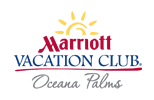 Marriott Ocean Palms
Marriott Ocean Palms
Marriott’s Oceana Palms is one of many resorts within Marriott Vacations Worldwide and has been recognized for outstanding performance for a variety of departments, associate engagement, and also won Resort of the Year in 2014. Marriott’s Oceana Palms achieved Marriott Vacations Worldwide World Class Resort in 2015 for outstanding performance on several metrics, including financials, guest satisfaction, associate engagement and community outreach efforts.
Marriott’s Oceana Palms is located on the beautiful Singer Island in Florida. The resort rests directly on the beach and offers breath-taking views of the Atlantic Ocean from every villa on property, and the location on Singer Island allows the hotel the opportunity to protect many sea turtle nests that appear between nesting season, March 1 and October 31, and provide many enrichment programs and tools for owners and guests to learn more about the local sea turtles and conservation efforts.
In addition to conservation efforts related directly to the sea turtles, Marriott’s Oceana Palms has initiated a “Green Team” that meets to discuss ways to conserve and help protect the environment.
Marriott’s Oceana Palms, and Chris Cano, the leader and General Manager of Marriott’s Oceana Palms, are nominated as the Blue Business of the Year for the commitment to conservation, education, and to the community.
In 2016, Marriott’s Oceana Palm promoted the importance of educating owners and guests about our local waterways. The Beach Team is seasoned and knowledgeable about the local reefs, tides, currents and marine life and is able to share information with owners and guests. They currently hold Gold status with Audubon International and registered as a Florida Green Lodging resort with the Department of Environmental Services. The hotel provides on-going education for associates, owners and guests on sea turtle hatchlings and conservation efforts. Weekly, they host Turtle Conservation, which is a planned activity to educate our owners and guests about our local sea turtles and conservation efforts, and provides awareness of possible harmful behaviors. Placards are posted around the pool and the deck area going to the beach, which provides information about the life cycle of loggerhead sea turtles and tips on how to help conserve these marine animals. The hotel continues with on-going symbolic adoptions of loggerhead sea turtles via Loggerhead MarineLife Center; holds “turtle banks” around property where owners, guests and associates are encouraged to drop coins to promote our conservation efforts, alongside countless other green initiatives around the property and donating to various local charities and do our best to give back to our community.
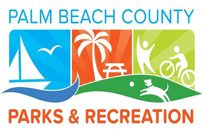 Palm Beach County Parks & Recreation
Palm Beach County Parks & Recreation
2700 6th Avenue South, Lake Worth, Florida 33461
http://www.pbcgov.com/parks/
Palm Beach County Parks and Recreation (PBC Parks) holds a long standing multi-faceted approach to promoting (and protecting) Palm Beach County’s beautiful environmental spaces and their immediate support of LMC’s new Balloon Ban. PBC Parks houses many unique recreational and cultural facilities, like Loggerhead Marinelife Center in Loggerhead Park, Phil Foster Park (one of Palm Beach County’s most accessible and biodiverse scuba and snorkeling trails), and the Juno Beach Pier (operated by Loggerhead Marinelife Center).
In addition to park spaces, PBC parks hosts multiple events which are tailored to help promote protection and education for the environment events include beach cleanups, educational sessions for guests of all ages. the Coastal Conservation Concert (C3), a community event celebrating coastal habitats and conservation and the LMC Balloon Ban – tested and launched in Loggerhead Park.
This year in partnership with Loggerhead Marinelife Center, Palm Beach County Parks and Recreation approved the first ‘test’ deployment of LMC’s balloon ban in Loggerhead Park. This successful partnership between Parks and LMC was responsible for eliminating balloons from Loggerhead Park’s rental pavilions which are adjacent to one of the most important sea turtle nesting beaches on our planet. In addition, Loggerhead Park is also a hot-spot for birders. Sea turtles and birds are often the unintended target of balloons and these animals can frequently become entangled in balloons and or mistake them for food, ingesting the balloons which frequently leads to the animal’s death.
Because of Palm Beach County Park’s approval of this test case, LMC and PBC Parks gained a tremendous amount of media for our test case which resulted in the balloon ban being adopted by 12 municipalities. More information on this program is available here: https://marinelife.org/four-south-florida-counties-now-implementing-balloon-ban/
Palm Beach County’s park system offers the widest possible range of leisure opportunities. Over 8,000 acres of parkland are available to discover. Sports, fitness, environmental and cultural opportunities abound, as well as restful places for solitude. Their mission is to “make the quality of life for Palm Beach County residents and visitors better by providing diverse, safe and affordable recreation services, welcoming parks, and enriching social and cultural experiences. This is achieved by promoting wellness, fostering environmental stewardship, contributing economic value, and by improving our community every day for this and future generations,” while their vision is to be a nationally recognized parks and recreation leader that connects people and parks by:
- Engaging all members of our diverse community
- Ensuring safe, functional and innovative amenities now and in the future
- Continually developing professional, well trained staff that mirrors our community
- Being the premier outdoor recreation destination in South Florida
- Forming strategic relationships to ensure local access to green space
- Exceeding the national average of park land per capita
- Advancing services through the incorporation of new technologies
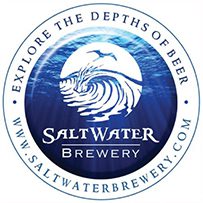 Saltwater Brewery
Saltwater Brewery
1701 West Atlantic Avenue, Delray Beach, FL 33444
http://www.saltwaterbrewery.com/home
Saltwater Brewery is a Palm Beach County based brewery who has a very rich focus on community collaborations and support with a specific focus of their corporate mission about ocean conservation. From the “mission” section of their website: Our goal is to maintain the world’s greatest wonder by giving back to the ocean through Ocean Based Charities (CCA, Surfrider, Ocean Foundation, MOTE).
In addition to supporting great marine-related organizations, Saltwater noticed a significant problem in their industry, noting that most plastic beverage six‐pack rings end up in our oceans and pose a serious threat to wildlife. Together with an organization called Webelievers, Saltwater Brewery ideated, designed, tested and prototyped the first ever Edible Six Pack Rings. A six‐pack packaging, made with byproducts of the beer making process, that instead of killing animals, feeds them. They are also 100 percent biodegradable and compostable.
The edible six pack campaign garnered local, national, and even international attention which was great for Saltwater Brewery but even better for our ocean and our marine life! Impressions on YouTube are nearly 500,000 and Saltwater Brewery had hundreds of traditional and digital media articles written about their innovative product and innovative corporate culture designed to give back and protect the ocean and marine life.
Please view the YouTube video to see an overview of the innovative 6-pack-rings please watch the video at this link on YouTube:
The video is also available at Saltwater Brewery’s website:
http://www.saltwaterbrewery.com/community-swb/
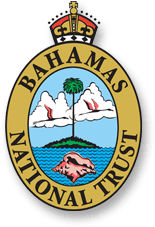 Bahamas National Trust
Bahamas National Trust
The Bahamas National Trust exemplifies outstanding contributions towards promoting and encouraging conservation, restoration, or preservation of marine life and/ or marine ecosystems through their business practices. This organization extends its reach through multiple parks located in Abaco, Andros, Conception Island, Crooked Island, and Eleuthera. Through the implementation of science projects, The Bahamas National Trust has produced a positive impact on marine conservation. The Bahamas National Trust addresses marine conservation through their Rapid Ecological Assessments (REAs), Reverse the Decline (RTD) project, Conch-servation campaign, GIS unit, and National Park Research Projects. The execution of REAs helps with park planning, management activities, identification of new areas to protect, and gives the organization a more detailed understanding of the habitats health status and species of concern.
While REAs address the overall assessment of various habitats, the RTD focuses on one specific marine conservation issue – coral. This project is aimed at reversing the decline of key reef building coral species in The Bahamas. Reversing the decline of key reef building coral species is essential to sustaining fish populations. According to the World Resources Institute, “properly managed coral reefs can yield an average of 15 tons of fish and other seafood per square kilometer each year” (WRI). The RTD seeks to protect key coral reef building species, such as the branching elkhorn and staghorn corals. In addition, the RTD is a long-term project that aims to promote research, conservation, policy and education.
The conservation mindset of The Bahamas National Trust extends through to the organizations’ corporate culture. Within the organization, The Bahamas National Trust has an active Wildlife Committee. This committee is comprised of staff who provides assistance to other specialty marine life groups. One of these specialty groups is the New Providence Bird Club, formerly known as the Ornithology Group), which has been an active group since 1994.
In addition to helping other organizations and groups flourish, The Bahamas National Trust promotes education of marine conservation through internships, certification programs, citizen science projects, an eco-tour guide training program, and volunteer opportunities. In 2015 more than 12,000 students participated in The Bahamas National Trust’s Outdoor Environmental Classroom. Education Director Portia Sweeting has said that these outdoor classroom experiences “are designed to connect students to the parks and complement the Ministry of Education’s science and Social studies curricula by acting as outdoor classrooms” (The Bahamas National Trust). Recently, the organization has expanded these classroom experiences to include a demonstration on reusing discarded materials to produce higher value items. Through all of these programs and initiatives, The Bahamas National Trust facilitates a culture of ocean and marine conservation.
Additionally, The Science and Policy Department of The Bahamas National Trust pursues conservation and improvement of marine life by disseminating scientific information through conferences, publications, and training. With a variety of projects, policies, committees, programs and volunteer opportunities The Bahamas National Trust increases ocean conservation on a local, national and global scale.
